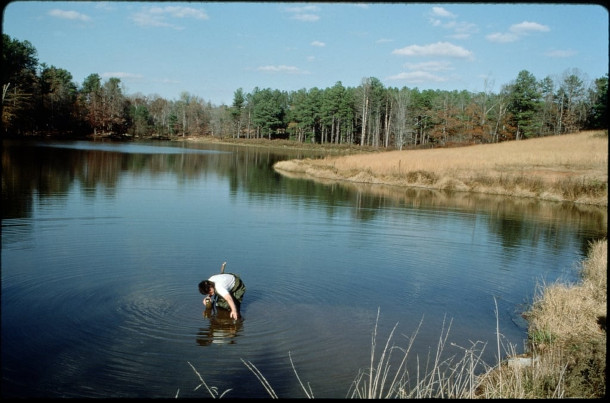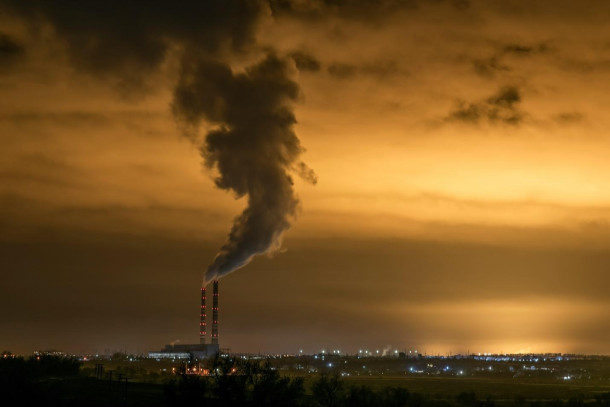EPA Shutting Down Independent Research
Air Date: Week of July 25, 2025

A scientist in the Office of Research and Development collects samples for water testing. The ORD represents 50 years of independent scientific research at the EPA. (Photo: U.S. EPA, U.S. Archives, public domain)
The US Environmental Protection Agency is shutting down its Office of Research and Development, which represents 50 years of independent scientific research. Kyla Bennett is director of science policy for Public Employees for Environmental Responsibility, and she joined host Aynsley O’Neill to discuss the impact on EPA employees and science.
Transcript
O’NEILL: From PRX and the Jennifer and Ted Stanley Studios at the University of Massachusetts Boston, this is Living on Earth. I’m Aynsley O’Neill.
The US Environmental Protection Agency says it’s going to shut down its Office of Research and Development. Though the agency is couching the move as just the latest in a series of staff and budget cuts, the Office represents 50 years of independent scientific research. It’s estimated that hundreds of ORD employees will be reassigned or let go as a new research branch is founded directly under the office of EPA Administrator Lee Zeldin. The announcement was welcomed by industry groups, including the American Chemistry Council, which said the new system would be more efficient. Kyla Bennett is director of science policy for Public Employees for Environmental Responsibility, and she joins me now. Kyla, welcome back to Living On Earth.
BENNETT: Thank you so much for having me.
O'NEILL: So, Kyla, tell us, what is the Office of Research and Development under the EPA? Why is that office so important?
BENNETT: This work that the people at ORD do does everything from protecting the public from harmful chemicals, to setting air quality standards, working on climate change issues, keeping our drinking water safe, and they also fund a lot of research elsewhere, academia, and other places. So, it's a super important, theoretically, independent division, which is much needed by EPA.
O'NEILL: And when you say independent, what's the significance of this being an independent office?
BENNETT: EPA can be politically susceptible. We have seen it numerous times, particularly in the Pesticides Office and the New Chemicals Office, where industry has a lot of sway over EPA decision making, and that is under all administrations, not just this administration, although it's much worse under the Trump administration, but ORD was always meant to be independent and outside the reigns of the political appointees. It's supposed to be a purely science section that does the science and informs and supports what the rest of EPA is doing without that political interference, and by eliminating this office and subsuming those duties, or some of them anyway, into the regular parts of EPA, we're losing that independence.

Scientists with the EPA’s Office of Research and Development were charged with conducting independent research. One such area of study would have the goal of ensuring that emissions from factories don’t endanger neighboring communities. (Photo: André Robillard, Unsplash, public domain)
O'NEILL: Well, I've seen that the EPA has previously announced plans to create a new office called the Office of Applied Science and Environmental Solutions. However, instead of it being independent, it'll be under the Office of the Administrator. What do you make of that move?
BENNETT: I think it's really plain to see that what they're doing is they're making this office that reports directly to Administrator, Lee Zeldin, so that he can influence and manipulate their decisions. So, it's exactly the opposite of what we have now and exactly the opposite of what we want.
O'NEILL: And to what extent can other offices do the work of the ORD?
BENNETT: Well, they can't really. I mean, one good piece of news is that they did announce in an all-hands meeting that they are not going to get rid of the labs, and they can't really get rid of the labs. There are EPA ORD labs scattered across the country. We have two here in New England. There's one in the Midwest. They're all over, and the reason they can't get rid of them is because they're statutorily mandated, so getting rid of them would be violating those statutes. But that being said, these people in the labs are now going to be reporting to the people who report directly to Lee Zeldin, so they will now become susceptible to that political interference.

Critics of the EPA’s decision to dismantle the Office of Research and Development say it will endanger the nation’s ability to combat threats posed by chemical emissions and climate change. (Photo: Roman Khripkov, Unsplash, public domain)
O'NEILL: And Kyla, please explain to us what those labs are actually doing.
BENNETT: The labs actually do research. They collect water samples and air samples, they look at wildfires and check the smoke. They generate data and develop methodologies to study the impacts of chemicals or air pollution or global warming, so they're actually doing the research. Most people, when they think about EPA, they probably think about people in white coats with, you know, a Bunsen burner and an Erlenmeyer flask, actually doing experiments. And the people in the regions and headquarters don't actually do that. The only people that actually do that are the Ord people. So, while that research will continue in a more limited amount, the information that they generate will now be politically susceptible, and that's a huge problem.
O'NEILL: And so, Kyla, what does this announcement that they'll be closing this office— What does that mean in terms of the implications for environmental protection?
BENNETT: The implications of closing ORD are huge, and no one should be fooled by the agency's announcement that these key ORD functions will be absorbed into EPA's existing offices. They're going to be firing, I don't know, maybe about 1000 people. We don't even know yet. But what this means is that Americans will no longer have the benefit of all this science which protects their everyday life. I don't think the American public fully appreciates how much EPA does for them behind closed doors. When you turn on your tap, and you can fill up a cup of water and drink it. When you go outside, and you can take a jog and breathe the air. When you can grow a vegetable garden, when you can do all of these things that we do every single day, we can do it thanks to EPA without ORD, testing and looking into issues and problems and toxic chemicals and pollution, and even water quality and water quantity, we're flying blind. We really won't be able to tell whether Americans can safely drink the water, safely breathe the air, or safely do anything that they usually do in their day-to-day lives.
O'NEILL: Already, under the second Trump administration, the EPA has seen a great reduction in numbers, many of employees being fired, many employees resigning, all sorts of things like this. What does the closing of this office mean on a personal level for the employees who previously worked in ORD?
BENNETT: There are people who literally make careers out of this because they love their work. They love what they do. They love protecting human health and the environment. And working at EPA was a good way to do that. And you know, for a lot of these federal employees, their spouses or partners are also federal employees. And I know of several people, clients, whose spouses have been “RIF-ed” from another federal agency, and now they're being “RIF-ed” as well. These people who are being “RIF-ed”, and “RIF” means a reduction in force, and that's what EPA is calling this. Although we don't believe that they were following the correct procedures for an actual RIF. So, it's devastating to families. It's going to be devastating to the real estate market in Washington, DC. It's going to be devastating to these families, their children, everybody. It's just horrifying.
O'NEILL: And Kyla, let's say in the next election, we elect a president who wants to bring back an independent Office of Research and Development at the EPA. How easy is it going to be for a potential future ORD to fix what has been broken?

Kyla Bennett, PEER Director of Science Policy, is a former EPA employee. Some of her former colleagues still work at the federal agency. (Photo: Courtesy of Kyla Bennett)
BENNETT: I think it's unfortunately going to be very, very difficult for a couple reasons. First of all, the agency is going to be staffed with mostly the people who will be loyal to Trump and his administration. I mean, they're asking for that type of loyalty pledge. Second, we're losing the historical knowledge. We're losing the very people, the scientists who are fleeing. People are fleeing to other countries. It's going to be hard to get that back. The experience that some of these scientists have, having worked at the agency for decades, is really, really difficult to replace. And while nobody is truly irreplaceable, when you have this attack on an agency at such a large scale, we're losing so much institutional knowledge. There's such a big brain drain that it's going to take us decades that we cannot afford to get it back.
O'NEILL: And this is going to have such wide-reaching implications, and lots of people are obviously going to be very dramatically affected. Who would you say this is going to hurt the most?
BENNETT: That's the interesting thing about this. It's going to hurt everybody, and it's very different from getting food poisoning. So, if you eat a bad tuna fish sandwich and you're vomiting six hours later, it's not going to be like that. But in six months, a year, two years, we're going to start to see more illnesses. We're going to start to see scarcity of water. We're going to start to see more smog. We're going to start to see worse climate events. It will come slowly but surely, and it's going to be affecting everybody who lives in this country.
O'NEILL: Kyla Bennett is the Director of Science Policy at public employees for environmental responsibility. Kyla, thank you so much for joining me today.
BENNETT: Thank you so much for having me.
Links
Public Employees for Environmental Responsibility (PEER)
Public Employees for Environmental Responsibility | “EPA Shuts Down Its Scientific Research Office”
Wired | "Employees Still in the Dark as Agency Dismantles Scientific Research Office"
Living on Earth wants to hear from you!
Living on Earth
62 Calef Highway, Suite 212
Lee, NH 03861
Telephone: 617-287-4121
E-mail: comments@loe.org
Newsletter [Click here]
Donate to Living on Earth!
Living on Earth is an independent media program and relies entirely on contributions from listeners and institutions supporting public service. Please donate now to preserve an independent environmental voice.
NewsletterLiving on Earth offers a weekly delivery of the show's rundown to your mailbox. Sign up for our newsletter today!
 Sailors For The Sea: Be the change you want to sea.
Sailors For The Sea: Be the change you want to sea.
 The Grantham Foundation for the Protection of the Environment: Committed to protecting and improving the health of the global environment.
The Grantham Foundation for the Protection of the Environment: Committed to protecting and improving the health of the global environment.
 Contribute to Living on Earth and receive, as our gift to you, an archival print of one of Mark Seth Lender's extraordinary wildlife photographs. Follow the link to see Mark's current collection of photographs.
Contribute to Living on Earth and receive, as our gift to you, an archival print of one of Mark Seth Lender's extraordinary wildlife photographs. Follow the link to see Mark's current collection of photographs.
 Buy a signed copy of Mark Seth Lender's book Smeagull the Seagull & support Living on Earth
Buy a signed copy of Mark Seth Lender's book Smeagull the Seagull & support Living on Earth

